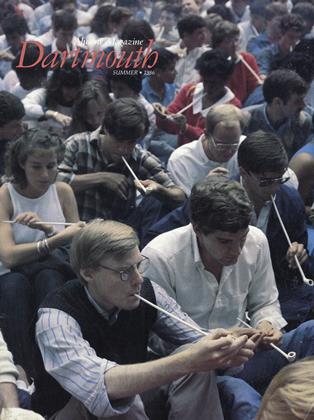The former president of CBS News and the former head of the Peace Corps were among the visitors to campus during spring term.
The Senior Symposium, the graduating class's annual intellectual gift to the College, brought a couple of notable speakers to Hanover to explore the topic "Ethical Dilemmas." Fred Friendly, former president of CBS News, moderated a lively discussion, badgering panelists from the media (including several alumni) with questions such as under what circumstances they'd secretly read a classified document. Another noted participant in the symposium was Paul Armstrong, lawyer for the family of Karen Ann Quinlan in the famous right-to-die case. In a public lecture, he called ethics of the dying "an uncharted sea" due to continuing breakthroughs in medical technology.
The founding director of the Peace Corps, R. Sargent Shriver, came to campus in late April as part of the nationwide celebration of the Peace Corps's 25th anniversary. In a public lecture, he said he feels the slogan "Peace through strength" should be reversed: "We ought to say that the mission of America is "Strength through peace.' " He said though there is support in Congress and from Reagan for expansion of the Peace Corps, its budget is the same today as when he left the directorship in 1965.
Athol Fugard, the noted South African playwright and actor, was another springterm visitor. A leading opponent of apartheid, Fugard has written several awardwinning plays, co-starred On Broadway in his own play, The Blood Knot, and appeared in supporting roles in such films as Gandhi and The Killing Fields. He received a tribute from the Dartmouth Film Society, participated in a panel on "Art and Politics/' and met with students. Despite the powerful subject of his works, Fugard told audiences that "I never write from hatred or venom. . . I write out of a celebration."
Ethics were again the subject when the College's Ethics Institute, the Class of '89, and Concern for Dying, a national educational council based in New York, sponsored a symposium in late May. Burn victim Dax Cowart - whose unsuccessful struggle with doctors, lawyers, and family members to discontinue painful therapy and return home to die was documented in a 1974 film - came together in Hanover with a panel of legal, medical, and film experts to explore issues raised by his case.
Views of international politics were provided during spring term by Israeli journalist Youssef Bar El, who advocated a political federation rather than a geographic partition as a solution to Middle East conflicts; and by Oxford University professor L. James Sharpe, who assessed the political record of British Prime Minister Margaret Thatcher.
CBS vice president Neal Pilson visited campus in April to present a 45-minute documentary on the world of network TV called Making Television: Inside CBS. Pilson also met with a government class and with students interested in broadcasting.
Among the academics who came to campus during the spring were Eleanor Gibson, the first woman to hold an endowed chair at Cornell and a leader in the psychological study of human infancy, who spent the term as a Montgomery Fellow; and Risa Palm, a professor of geography at the University of Colorado and president of the Association of American Geographers, who spoke on public disclosure of information about earthquakes and other hazardous situations.
Former Peace Corps director Sargent Shriverexhorted students to achieve "strength throughpeace."
South African playivright Athol Fugard(right) spellbound his audiences includingPresident McLaughlin.
 View Full Issue
View Full Issue
More From This Issue
-
 Feature
FeatureYou Laughed
June 1986 By Nancy Wasserman '77 -
 Feature
FeatureCOMMENCEMENT
June 1986 -
 Feature
FeatureReunions 1986
June 1986 By Richard Hovey -
 Article
ArticleErik and Kris Hagerman: A tale of two seniors
June 1986 By Lee McDavid -
 Article
Article"More than Teacher"
June 1986 By Dorothy L. Foley '86 -
 Article
ArticleStephen W. Bosworth '61: Public servant in the spotlight
June 1986 By Robert H. Conn '61
Article
-
 Article
ArticleNOTES
August 1921 -
 Article
ArticleA Day in the Life of an '80
December 1988 -
 Article
ArticleHoward Fogg: “Railroad Man with an Easel”
June 1980 By Arlington Bensel ’38 -
 Article
ArticleTuck School
OCTOBER 1970 By Bob Kimball T’48 -
 Article
ArticleClass Notes
Nov/Dec 2001 By Mateo Romero '89 -
 Article
ArticlePomp and Circumstance
Sept/Oct 2001 By Michael Glenzer '01

